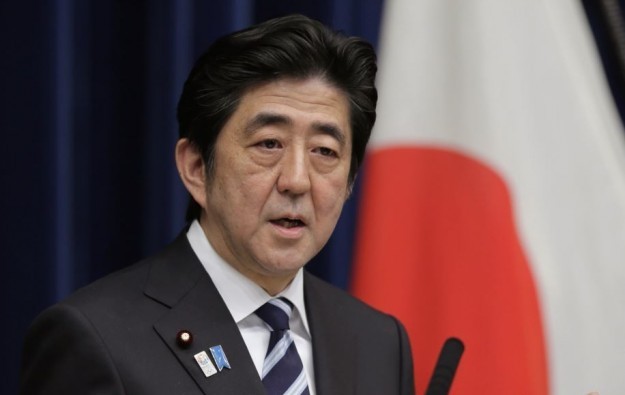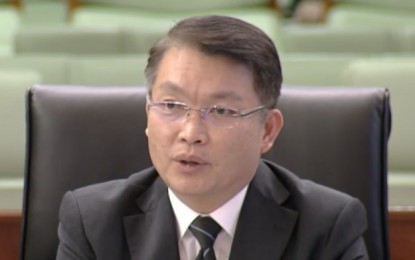Abe to stick to 2021 casino schedule, Tokyo to bid: GMA
Apr 27, 2020 Newsdesk Japan, Latest News, Top of the deck

The January 2021 to July 2021 application period for local authorities to ask Japan’s central government for the right to host a casino resort “will likely not move for a host of reasons,” suggests a research paper from consultancy firm Global Market Advisors LLC (GMA).
GMA also thinks it is “not a matter of if but when” Tokyo will announce it is a contender to host a casino resort.
Regarding the national application process, the gaming industry consultancy suggested that, were the date to be pushed back, “it is less likely that the integrated resort champion, Prime Minister [Shinzo] Abe [pictured], will be spearheading the project.” In mid-April a minister said there were no plans to change the application schedule.
In Japan large-scale casino complexes with tourism and meeting facilities are known as integrated resorts (IRs). A maximum of three will be permitted nationally in the first phase of market liberalisation, and any local government wishing to have one will need to find a private-sector partner then apply to the national government for permission.
Japan currently has in place a state of emergency to try to quell locally the Covid-19 pandemic. Although the measure falls short of the sort of lockdowns that have been seen in neighbouring nations such as China and the Philippines, a number of commentators has suggested Japan’s situation and the global context – that has already seen the delay until next year of the Tokyo Olympics that had been due this summer – risks slowing the casino liberalisation process.
The GMA paper noted: “With public opinion still not in favour of IR implementation, as the public has not been appropriately educated on the subject through a targeted education campaign that highlights the IRs, there is still a bill in the Diet [parliament] that would abolish the IR policy entirely.”
Tokyo a contender
Regarding the cities in the race for a Japan casino resort, the consultancy stated: “Currently, GMA believes that there are only six viable locations, with two of these – Nagoya and Tokyo – yet to formally raise their hands in the process.”
It noted: “The other four prefectures that have active efforts are Nagasaki/Sasebo, Osaka, Wakayama, and Yokohama.”
GMA said it had “long stated” that it was “not a matter of if but when” Tokyo would announce it would participate in the process. Such an announcement could occur “by the end of this summer following the governor’s [Yuriko Koike’s] re-election,” suggested the organisation.
‘The addition of Tokyo could cause several operators and prefectures to potentially rethink their strategy,” GMA asserted.
The institution described the opportunity for international casino operators to invest in the Japan market as “a ship worth sailing.” But it noted a number of important concerns that it said had come sharply into focus due to the Covid-19 pandemic that has shuttered casinos – including operations of Japan suitors – across the world and also hurt their balance sheets.
A figure of as much as US$10 billion for a single resort had been mentioned by some suitors prior to the novel coronavirus crisis. “While it is more expensive to build an integrated resort in Japan, the US$10 billion figure was already in question as operators and prefectures were trying to fully understand the opportunity from a financial perspective,” stated GMA.
“While not an original part of any process, the stress test on balance sheets that has not occurred in previous RFI [request for information] or RFC [request for concept] efforts will now likely be added,” said the consultancy. It was referring latterly to preliminary phases of discussion between Japanese local governments and private-sector firms.
‘Cart before horse’
GMA said one of the biggest hurdles for would-be investors was that they were being asked for their ideas – and in the case of Osaka even to participate in a request-for-proposal (RFP) phase – before knowing the firm details of national government policy. The consultancy described that as “putting the cart before the horse”.
“Operators that are bidding in each of the prefectures are now being asked to provide commitments to the market when they still do not know the full rules that will be implemented and, therefore, cannot yet fully understand the market opportunity,” stated the consultancy.
The central government’s so-called IR basic policy had been due in March, according to commentary from the national authorities earlier this year. The government first made public a draft version of the IR basic policy in early September.
“Currently in Nagasaki – and with the recent delay in Yokohama – potential bidders may get a fair advantage to determine their best business plan and RFP submission, as they [those processes] would be due after the fundamental policy release, should it stay on schedule. Osaka and Wakayama have already launched their RFP processes,” observed GMA. Several prefectures have already announced the postponement of their preparation timetable to host a casino scheme.
The consultancy also noted the risk of “killing the golden goose” in terms of the burden of regulation, citing as an example an idea that emerged last year, that foreign visitors should be taxed on any winnings earned in a Japan casino.
“If this tax would be implemented, it would destroy the market opportunity on foreign gamblers,” GMA asserted.
Related articles
-
 Ex-500.com gets US$10mln penalty for...
Ex-500.com gets US$10mln penalty for...Nov 19, 2024
-
 Further Japan IR phase to play for amid...
Further Japan IR phase to play for amid...Oct 31, 2024
More news
-
 Macau to get 36mln visitors in 2025:...
Macau to get 36mln visitors in 2025:...Nov 21, 2024
-
 EBITDA a focus in Macau market share...
EBITDA a focus in Macau market share...Nov 21, 2024
Latest News
Nov 21, 2024
Macau’s 2025 visitor tally could reach 36 million, or a circa 9-percent gain on this year’s projected 33 million. So said Lei Wai Nong (pictured in a file photo), the city’s Secretary for...Sign up to our FREE Newsletter
 (Click here for more)
(Click here for more)
Pick of the Day
”[Baccarat side bets in Macau] are becoming more popular amongst players, based on what we observed when we conducted our [monthly premium mass] table surveys”
George Choi and Timothy Chau
Analysts at Citigroup
Most Popular
 Gaming technology firm IGT reports hacking incident November 21, 2024
Gaming technology firm IGT reports hacking incident November 21, 2024  US$30bln 2025 GGR target achievable for Macau: CE November 19, 2024
US$30bln 2025 GGR target achievable for Macau: CE November 19, 2024  Marina Bay Sands projects 40pct EBITDA leap post extension November 20, 2024
Marina Bay Sands projects 40pct EBITDA leap post extension November 20, 2024  Macau big-event outdoor venue gets trial run Dec 28: CE November 20, 2024
Macau big-event outdoor venue gets trial run Dec 28: CE November 20, 2024  Future of gaming is the online format: Pagcor chairman November 20, 2024
Future of gaming is the online format: Pagcor chairman November 20, 2024









